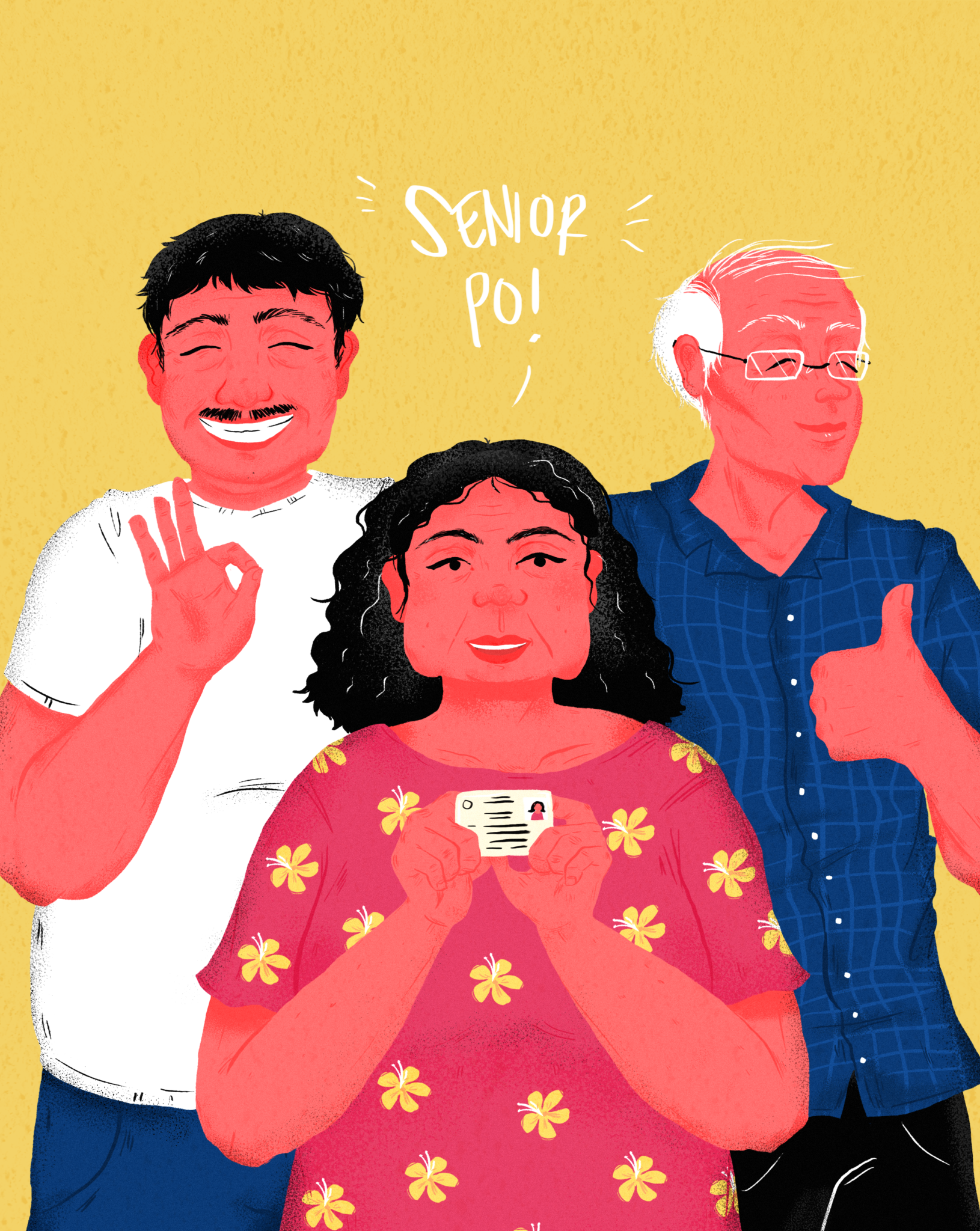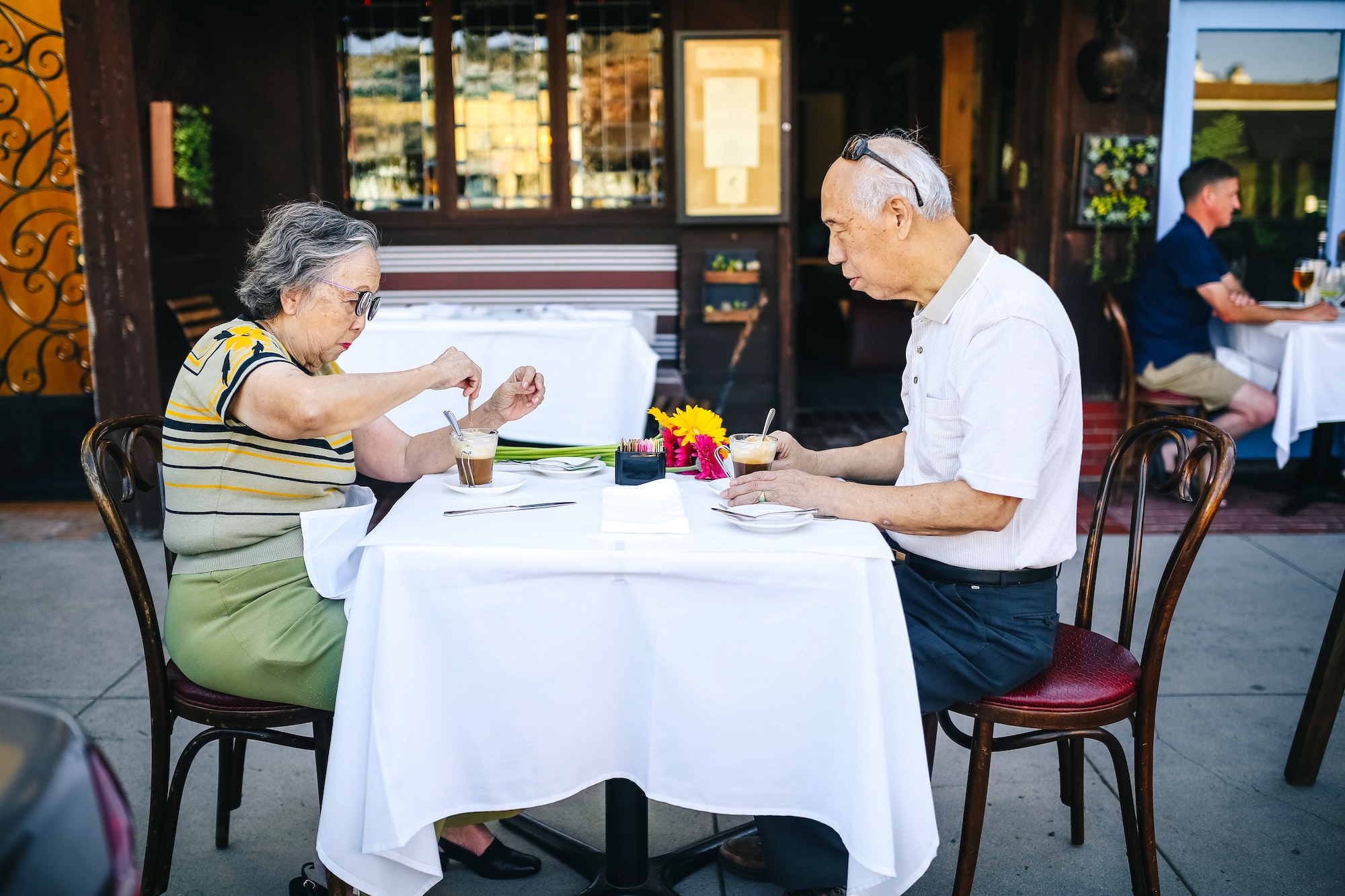When reaching the graying years of 60, one of the first sources of excitement is acquiring a senior citizen card. For those ready and eager to retire, there is nothing sweeter than being able to purchase plane tickets, hotel accommodations, movie passes, and even meals at discounted prices. But of course, with every right comes rules to guide individuals and to protect restaurant owners.
Who can avail senior citizen benefits
Republic Act No. 9994, Expanded Senior Citizens Act of 2010 or the “Senior Citizen Law” defines senior citizens as Filipino residents at least 60 years of age who are entitled to a 20 percent discount and an exemption from the 12 percent value-added tax (VAT) imposed on the sale of services from restaurants.
For this purpose, the term “senior citizen benefits” shall refer to the 20 percent discount and the exemption from the 12 percent VAT granted to seniors.
How to avail
The senior citizen must be physically present and show any valid Philippine government-issued identification document reflecting their date of birth. Benefits can only be applied to the food or beverage personally consumed by the senior citizen, except for food marketed as children’s meals, pre-contracted party packages or bulk orders, and promotional discounts. In cases when restaurants offer promotional discounts, they may only choose to avail either the promotional discount or the senior citizen benefits.
To ensure that these benefits are applied only to the meal of the senior citizen, restaurants are required to issue separate receipts for the senior citizen and for their non-senior citizen companions.
Where to avail
The Implementing Rules and Regulations of the Senior Citizen Law require only restaurants, including those in hotels and fast food chains, to offer these benefits. Restaurants in country clubs are not required, unless they operate as independent concessionaires.
How to compute
For dine-in services, senior citizen benefits should be applied to the separate meal with beverage of the senior citizen. However, for most Filipino families, senior citizens share meals with their family members. For sharing meals between family members or friends, the usual practice is to divide the cost of the shared meals by the number of those eating at the table and to apply senior citizen benefits only to the share of the senior citizen.
For takeout and delivery orders, senior citizen benefits should be applied to the combination of the most expensive single serving meal with beverage from the restaurant’s menu, regardless of what the senior citizen orders. What then are the recurring problems involving senior citizen benefits?
Restaurant owners share a common story of senior customers demanding that their benefits be applied to the entire bill, not just to their meal. Others explained that senior citizens would present fake IDs, foreign IDs, or no IDs yet demand for their benefits to be applied to their bill.

Some restaurant owners have encountered senior individuals who would request that their benefits be applied to an entire cake they were ordering while threatening to prove they could finish it in one sitting. It is also not an unusual practice for relatives of senior citizens to borrow their cards and use it to get a discount. There are instances when individuals lie about their age and birthdays just to avail of the discount.
These stories clearly show that senior citizen benefits are still a pressing and relevant concern for restaurateurs and food business owners. In hopes of lessening the difficulties surrounding senior citizen benefits, below are some guidelines for restaurant owners to know the extent and scope of senior citizens’ rights:
- Senior citizen benefits should only be applied to the food and beverage personally consumed by the senior citizen.
- The senior citizen should always be physically present and must present a valid Philippine government-issued ID.
- For dine-in services with sharing, the cost of the shared meals should be divided by the number of those eating and senior citizen benefits should be applied only to the share of the senior citizen.
- For takeout and delivery orders, the benefits should be applied to the combination of the most expensive single serving meal with beverage from the restaurant’s menu, regardless of what the senior citizen orders.
- A separate receipt should always be issued for the senior citizen.
Following such prescriptions, as mandated by the law, will protect not only the welfare of senior citizens but also the interests of one’s business. (Update: On July 25, President Rodrigo Duterte officially signed Republic Act 11350, which will create the National Commission of Senior Citizens (NCS). This new commission will see to it that policies and regulations will protect the welfare of Filipino seniors).
Today, Filipinos aged 60 and up can enjoy perks such as discounts when eating in restaurants and priority lanes when queueing up in establishments.
Grocery discounts
Senior citizens are entitled to five percent off retail prices on certain grocery items without VAT exemption. This discount is applicable to at least four categories of basic commodities worth up to P1,300 every week. Some of the food items included in the price reduction are:
- Rice, bread, and corn
- Fruits and vegetables
- Fresh eggs
- Milk and other dairy products
- Coffee, creamer, and sugar
- Cooking oil and salt
- Noodles
- Fresh, canned or processed meat products (chicken, beef, and pork)
- Canned sardines and canned tuna
To avail, senior citizens must purchase these groceries in supermarkets, convenience stores, and drug stores. Besides the card, they must also bring the OSCA (Office of the Senior Citizens Affairs) Purchase Booklet.
City-based perks
Certain local government units also implement their own special programs for their senior constituents, besides those mandated by the government. For instance, seniors in Makati and Pasig get free cakes during their birthdays and golden wedding anniversaries. The Caloocan LGU also provides grocery baskets.
With additional reporting by Nathelle Lumabad
Originally published in F&B Report Vol. 16 No. 1






Please clarify if the senior citizens discount is for Philippine Citizens only or includes Philippine Residents (i.e. Registered Foreigners retirees)?
Hi Francisco, we’ll be releasing a follow-up story on this. Please watch out for it
When i was in singapore the waitress ask us if their is SENIOR in our Group. My sister and I gave our ID and they honor it. Here in the Phil. i don’t know if the same in SINGAPORE?
are alcoholic drinks (beer, wine, whiskey, etc.) served in a restaurant subject to the 20% senior citizen discount? Thank you in advance for your help!
Hi Valerie, yes, they are. You may follow our Instagram (@fnbreport) and see our Stories for a visual guide to the Expanded Senior Citizens Act of 2010
Obligado po ba magbigay ng discount ang isang maliit na ice cream booth ? At magkano po tlga discount …ilng percent po ang dapat ibigay halimbawa bibili ng 1 scoop
Hi Shaira, yes. You may follow our Instagram (@fnbreport) and see our Stories for a visual guide to the Expanded Senior Citizens Act of 2010
What about the restaurant’s food promo packages, are they exempted from giving SC discounts?
Hi Leo, we answered your question in this new story: https://fnbreport.ph/features/senior-citizen-discount-faqs-mariansp-20200317/
for example may isang senior citizen na gumamit na ng ID for a meal, then after that he/she order again, can he/she again used the senior ID for another discount?
Hi Owen, you may visit this new story on senior citizen law FAQ: https://fnbreport.ph/features/senior-citizen-discount-faqs-mariansp-20200317/
hi.how about function room with consumable amount food. are these included? thank you
Hi James, we answered your question in this new story: https://fnbreport.ph/features/senior-citizen-discount-faqs-mariansp-20200317/
Discounted meals and meals on promos – do they still qualify for senior discounts?
Hi J, we answered your question in this new story: https://fnbreport.ph/features/senior-citizen-discount-faqs-mariansp-20200317/
How many times in a day can a senior citizen avail of a discount in the same restaurant?
Hi Nelia, we answered your question in this new story: https://fnbreport.ph/features/senior-citizen-discount-faqs-mariansp-20200317/
Hi. Is there any statement in the law that supports this statement:
“Senior citizen benefits can only be applied to the food or beverage personally consumed by the senior citizen, except for food marketed as children’s meals, pre-contracted party packages or bulk orders, and promotional discounts. “
Hi Vhanthzz, we answered your question in this new story: https://fnbreport.ph/features/senior-citizen-discount-faqs-mariansp-20200317/
Hi, I’ve encountered one time, I buy cake in goldilocks, I presented the SC I. D but goldilocks refuse to give me discount.
Hi Ramil, we answered your question in this new story: https://fnbreport.ph/features/senior-citizen-discount-faqs-mariansp-20200317/
Just wanna ask. For example one senior citizen is paying for the whole meal of 6 seniors, would that mean that they should present all their cards and give them all a discount?
Hi Kleyr, we answered your question in this new story: https://fnbreport.ph/features/senior-citizen-discount-faqs-mariansp-20200317/
Is someone is already entitled for the discount if they are about to turn 60 within the year?
Hi JM, we answered your question in this new story: https://fnbreport.ph/features/senior-citizen-discount-faqs-mariansp-20200317/
hi.. sa grocery discount, c miss ni senior ang nagdala ng ID and booklet.. as an employee of a grocery store, do we really need to ask for an authorization letter from the senior who owns the booklet? if authorization letter is not necessary, how do we know if buhay pa talaga ang may ari ng booklet? or baka ginamit lang ni miss kasi hindi pa xa senior and patay na c mister nya na senior
Hi, I work at a coffee shop and people who avail of their discount get upset if we refuse to discount a bag of coffee beans, since it’s for multiple consumption and we wouldn’t see them consume the beans all by themselves. How do we legally say it’s not allowed? Or is it allowed?
Goldilocks don’t give senior discount on cakes. They said cakes is not a basic commodity thus seniors are not entitled to discount. Is this right? If not where and how to communicate the complaint Goldilocks of not giving Senior discount? Ty
Hi! I used to buy whole cakes from different bakeries in Metro Manila, pre-lockdown.
Each bakery has a different SCD policy – some give 20% off the entire cake. Some give 20% to a percentage – what they said I will most likely eat. While others set a limit to the maximum discount amount for the entire bill.
Just curious – what is the correct discounted amount?
Hi!
Should a restaurant honored the discount for take out orders even if they only tasked the purchase to other person? Do we need to ask for an authorization or it is suffice that the other person presented the senior citizens’s ID on his/her behalf?
Thank you.
Hi Good day po, where we can find this article on BIR po, so we can post it or show it to our guest referring there discount po. kahit memo po sana? thank you in advance.
Hi. Can the Senior citizen discount apply even to 1 cup of rice bought from a store? I know legally it should apply automatically but it causes losses already.
Hi, we answered some new inquiries we received regarding senior citizen discount in this post: https://fnbreport.ph/features/senior-citizen-discount-on-food-businesses-during-covid-19-nathelle-20210604/
Are SMEs like talipapa eateries or canteens or carinderias covered by SC? ty
Hi, we answered some new inquiries we received regarding senior citizen discount in this post: https://fnbreport.ph/features/senior-citizen-discount-on-food-businesses-during-covid-19-nathelle-20210604/
Some groceries does not include all types of instant coffee, is the law clear on what types of coffee are included, specially high end ones?
Hi Rolando, we answered some of the new inquiries we received regarding senior citizen discount in this post: https://fnbreport.ph/features/senior-citizen-discount-on-food-businesses-during-covid-19-nathelle-20210604/